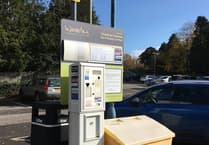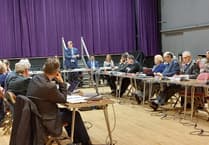I am a great crossword fan. Back in the years BC (Before Children) I occasionally managed to finish the Guardian cryptic. Perhaps 75 per cent completed was more typical.
The children have gone. I have retired. I now have the luxury of being able to look at the crossword in the morning.
And look is all I do. I have no idea if it’s advancing years or lack of practice, but I have to make do with the quick one these days.
The great joy of crosswords seems possible because of the diversity and ambiguity of English. Tip can be the small bit at the top. It can be the thank you given to staff after dining. It can be advice on a likely winner at the races. It can be a verb, to tip. It can be a noun, the tip.
I visited the tip in Petersfield the other day. I also visited the Petersfield Household Waste Recycling Centre at the same time apparently. We can be grateful for the flexibility of the English language for many things.
However, back to the Petersfield tip. It had a sign at the entrance proclaiming 97 per cent recycled (or words to that effect).
Sure enough, of all the huge waste bins on the site, only one was reserved for landfill waste. Of course, I had no idea how often it is emptied. But we always make the evidence fit whatever we want to believe.
The bin next to this one was labelled “energy recovery”. It is for anything that cannot be recycled elsewhere but will burn.
Its contents are incinerated and the heat used to generate power. The contents of this bin was mainly plastics.
The energy recovery process then turns one-use plastic into two-use plastic.
Plastic is a hydrocarbon material. It is produced from oil. So burning it produces carbon dioxide. It’s the same as burning coal, or oil, or gas.
Can this energy recovery process be counted as recycling? I think not.
We could make all plastic recyclable. Easier said than done, of course,– it would need a change of the current economic dogma.
It’s called neo-liberal economics – the market knows best. If we all refuse to buy non-recyclable plastic then only recyclable would be used.
One snag; we would have all starved to death first. Food is sold in non-recyclable plastic. The market would not bring about change quickly enough to save us.
Human ingenuity and technology could produce suitable recyclable plastics – if it had to.
“The market” won’t make it happen. Sensible legislation carefully applied could. Such legislation will not be made by the neo-liberal dogmatic Conservative Party. Nor the current Labour or Liberal Democrat parties.
Nor will neo-liberal economic dogma allow the state to make the massive investment needed to control climate change in time.
The Green Party does not use the neo-liberal economic model. It would make the massive investment needed. This investment would create a high-skill, high-wage economy and a fair, sustainable society.




